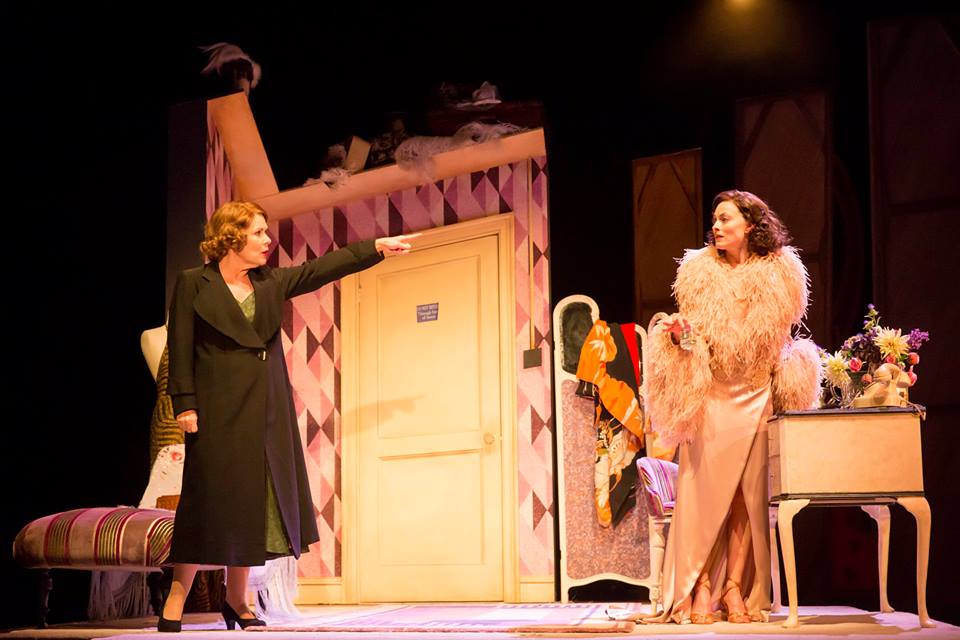“Everybody give a cheer!” Gypsy has returned to the West End after forty years. A period spectacular from the golden age of musicals sees the showbiz mother of your nightmares drag her weary family and their hilariously twee and mediocre act across Depression-hit America, as Vaudeville coughs out its last ragged breaths and a burlesque superstar waits in the wings to be born. The action centres on Momma Rose and her two daughters, June and Louise, the former prized and cherished as the star of the act, the latter overlooked and worn down.
I, like many of you, got my first glimpse of burlesque from the Hollywood film adaptation of Gypsy, starring Natalie Wood as the neglected Louise who transforms into one of our most iconic, unique and pioneering burlesque legends, Gypsy Rose Lee. The film inspires enduring passion and a sense of ownership in us: Gypsy is our fable – a burlesque fairytale which colourfully portrays our foremothers, based on Gypsy’s own memoirs. I felt it was important to set aside the vivid memories of the film and approach the new West End revival with fresh eyes and an open mind. What I discovered was a more complex and authentic portrayal full of new and intelligent creative choices from the cast, led by a veteran mistress of stage and screen, Imelda Staunton.

Rather than play an uncompromisingly monstrous harridan throughout, that an audience could struggle to like or take interest in, Staunton allows us to warm to Momma Rose at first, even admire her determination for a life beyond her father’s sleepy kitchen in Seattle. She is mischievous and flirtatious in Funny, a touching early duet with mild-mannered, middle-aged love interest Herbie (played and sung gently but appropriately by Peter Davison), and you laugh as she runs about picking up dropped hats and canes during an audition and snaps out sassy one liners. Then the laughter dies on your lips as she physically trembles while screaming at a secretary and grabs her daughter by the throat. These moments of volatility and violence are made all the more shocking and affecting by the fact that they happen suddenly and after unguarded moments of hope and humour.

Warm, playful and fiendish earworms like Mr Goldstone and Together Wherever We Go, which give a brief illusion of a harmonious family unit on the way up, make the moments of personal loss and destruction all the more poignant. As the first half draws to a close at a train station, with their act finished, the troupe disbanded and her precious younger daughter gone, the production takes an altogether more dark and desperate turn as Herbie and Louise, her two remaining exhausted companions, are forced to march on in pursuit of her dreams as Everything’s Coming Up Roses builds to a demented climax. Staunton’s voice is glorious, gritty and powerful, and adapts easily to a range of emotions and personal crises.

The portrayal of neglect and unhappiness in Gypsy is often marked by more subtly implied deprivation and unkindness, often at Louise’s expense. Baby Louise asks why June is allowed to sleep in Rose’s bed, only to be shooed away, and an older Louise has to take the dog out to do its business while the other three family members enjoy dinner together. When she eventually warms to Herbie, the new father figure in her life, and grows excited at the prospect of a proper family home and a chance to go to school, that too is brushed under the carpet and trampled on. Lara Pulver’s Louise is altogether more fragile and careful than Natalie Wood’s famous portrayal, even once her transformation into Gypsy Rose Lee has begun. While this makes you ache for the young girl in shapeless masculine clothes who sang a lullaby to her stuffed animals, as she stands vulnerable and alone on a burlesque stage in a half finished gown and borrowed gloves, it’s somewhat frustrating that when she finally stands up to her mother and shows her the door, she’s still too timid to really lash out and air her grievances. She has become everything her mother has fought against: a sexual, awake and independent success, with Let Me Entertain You, the innocent song of a young girl, now the calling card of a professional seductress.

The much loved trio of second rate strippers (we all have a favourite, right?) are stripped of their Hollywood gloss here – as is everything else – but are fabulously entertaining; a rusty, slack-bellied, no prisoners, sleazy highlight who win us over with the ultimate burlesque anthem You Gotta Get a Gimmick. Authentic burlesque performers are not required to make these colourful women live and breathe; they are caricatures from a mythical age of striptease and Anita Louise Combe, Julie Legrand and Louise Gold play them perfectly with warmth and wit.


This story could not be told without Jule Styne’s soaring, luscious music and gutsy, witty lyrics from Stephen Sondheim. The overture to Gypsy is the musical theatre equivalent of the opening to Bizet’s Carmen – a rousing, romantic, swaggering sweep of a score which builds to a circus stomp – and we enjoy an exquisite drop of pure MGM gold as Tulsa, played by a debonair Dan Burton, seeks his Cyd Charisse in All I Need is the Girl. The magical Styne-Sondheim combination is at the height of its power in the climactic Rose’s Turn, a breathtaking four-minute masterpiece from Imelda Staunton punctuated by shrieking trumpets, relentless strings and a musical monologue full of defiant bitterness and fear. Ultimately, we observe a complete role-reversal as Rose – finally old and broken – trots girlishly to catch up with her forgiving eldest child as they walk upstage and into legend.
On 21st century stages there seems to be an incessant need to modernize, minimize and present something strictly contemporary, as if that’s the only thing a modern audience will want or understand. Nonsense. A rich, warm, full bodied period piece like Gypsy is a feast for the senses that tugs at your heartstrings and transports you to a bygone era presented in glorious detail. Importantly, despite its enjoyably old fashioned qualities, Gypsy tells a timeless human story of missed opportunities, stolen chances, desperation and destiny. And, of course, burlesque.
Let Gypsy entertain you, and you’ll have a real good time, yes sir.
Gypsy reviewed by Holli-Mae Johnson.
Purchase tickets for Gypsy, starring Imelda Staunton and Lara Pulver.




What a superb piece of writing. Such intelligence and comprehension. Congratulations and thank you.
If Gypsy isn’t the best how in the West End, I don’t know what is.